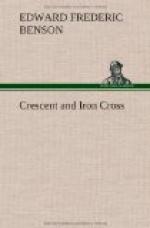Her policy with regard to them is set forth in a pamphlet by Dr. Davis Treitsch, called Die Jueden der Tuerkei, published in 1915, which is a most illuminating little document. These Jewish colonies, as we have seen, came from Russia, and as Germany realised, long before the war, they might easily form a German nucleus in the Near East, for they largely consisted of German-speaking Jews, akin in language and blood to a most important element in her own population. ‘In a certain sense,’ says Dr. Treitsch, ’the Jews are a Near Eastern element in Germany and a German element in Turkey.’ He goes on with unerring acumen to lament the exodus of German-speaking Jews to the United States and to England. ’Annually some 100,000 of these are lost to Germany, the empire of the English language and the economic system that goes with it is being enlarged, while a German asset is being proportionately depreciated.... It will no longer do simply to close the German frontiers to them, and in view of the difficulties which would result from a wholesale migration of Jews into Germany itself, Germans will only be too glad to find a way out in the emigration of those Jews to Turkey—a solution extraordinarily favourable to the interests of all three parties concerned.’
Here, then, is the matter in a nutshell: Germany, wide-awake as ever, saw long ago the advantage to her of a growing Jewish population from the Pale in Turkey. She was perhaps a little overloaded with them herself, but in this immigration from Russia to Palestine she saw the formation of a colony that was well worth German protection, and the result of the war, provided the Palestinian immigrants were left in peace, would be to augment very largely the number of those settling there. ‘Galicia,’ says Dr. Treitsch, ’and the western provinces of Russia, which between them contain more than half the Jews in the world, have suffered more from the war than any other region. Jewish homes have been broken up by hundreds of thousands, and there is no doubt whatever that, as a result of the war, there will be an emigration of East European Jews on an unprecedented scale.’ This emigration, then, to Palestine was, in Germany’s view, a counter-weight to the 100,000 annually lost to her through emigration to America and England. With her foot on Turkey’s neck she had control over these German-speaking Jews, and saw in them the elements of a German colony. Her calculations, it is true, were somewhat upset by the development of the Zionist movement, by which those settlers declared themselves to have a nationality of their own, and a language of their own, and Dr. Treitsch concedes that. ‘But,’ he adds, ’in addition to Hebrew, to which they are more and more inclined, the Jews must have a world-language, and this can only be German.’
This, then, in brief, and only up to the present, is the story of how the Jewish massacres were stayed. The Jews were potential Germans, and Germany, who sat by with folded hands when Arabs and Armenians were led to torture and death, put up a warning finger, and, for the present, saved them. In her whole conduct of the war, nothing has been more characteristic than her ‘verboten’ to one projected massacre and her acquiescence in others. But, as for her having saved the Jews out of motives of humanity, ‘Credant Judaei!’




